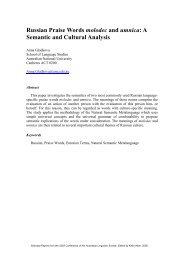ALS 2010 Annual Conference Programme - Australian Linguistic ...
ALS 2010 Annual Conference Programme - Australian Linguistic ...
ALS 2010 Annual Conference Programme - Australian Linguistic ...
You also want an ePaper? Increase the reach of your titles
YUMPU automatically turns print PDFs into web optimized ePapers that Google loves.
Clendon<br />
Mark Clendon<br />
ellentreow@internode.on.net<br />
Evidentiality in Worrorra<br />
Evidentiality in Worrorra is part of the meaning of a verbal form-class I will call<br />
Inferential. Inferential verbs constitute a distinct mood, analogous to indicative,<br />
optative and counterfactual.<br />
MOOD FUNCTION<br />
Indicative actualized events<br />
Optative projected events<br />
Inferential averted events<br />
Counterfactual unactualized events<br />
These four moods show varying degrees of event actualization or reality status,<br />
from indicative, in which events happen (realis), to counterfactual, in which events<br />
do not happen (irrealis). In between are two more irrealis moods; optative, in<br />
which an event does not happen but is expected to happen at some future time,<br />
and inferential, in which an event does not happen although it nearly happened<br />
(avertive reality status). This set defines a scale of actualization, from indicative<br />
through optative and inferential to counterfactual. The semantics of avertive<br />
modality involve irrealis meanings well suited to framing inferential logic, including<br />
hypothesizing. Mid-way between non-actualization and projection, logical<br />
inference is grounded in the preconditions for event actualization.<br />
Inferential verbs may convey irrealis meanings, but they are in many ways the<br />
opposite of counterfactual irrealis verbs: they may be used to affirm or assert a<br />
proposition’s validity on the basis of evidence. One of the most intriguing features<br />
of this morphology is the wide range of uses to which it is put; inferential<br />
verbs are found in three quite distinct functions. In modal use they signal avertive<br />
reality-status, and a root-modal frustrative mood. In evidential use they index a<br />
source of evidence for an utterance’s propositional content. And in their syntactic<br />
role they signal that the clause they head is subordinate to another, matrix,<br />
constituent. These three ultimately quite distinct functions are united by a common<br />
formal means of expression.<br />
Four kinds of evidential meaning may be distinguished:<br />
Non-firsthand: (i) antecedent general knowledge<br />
(ii) inference from stated antecedents<br />
Firsthand: (iii) immediately apparent evidence<br />
(iv) mirativity



